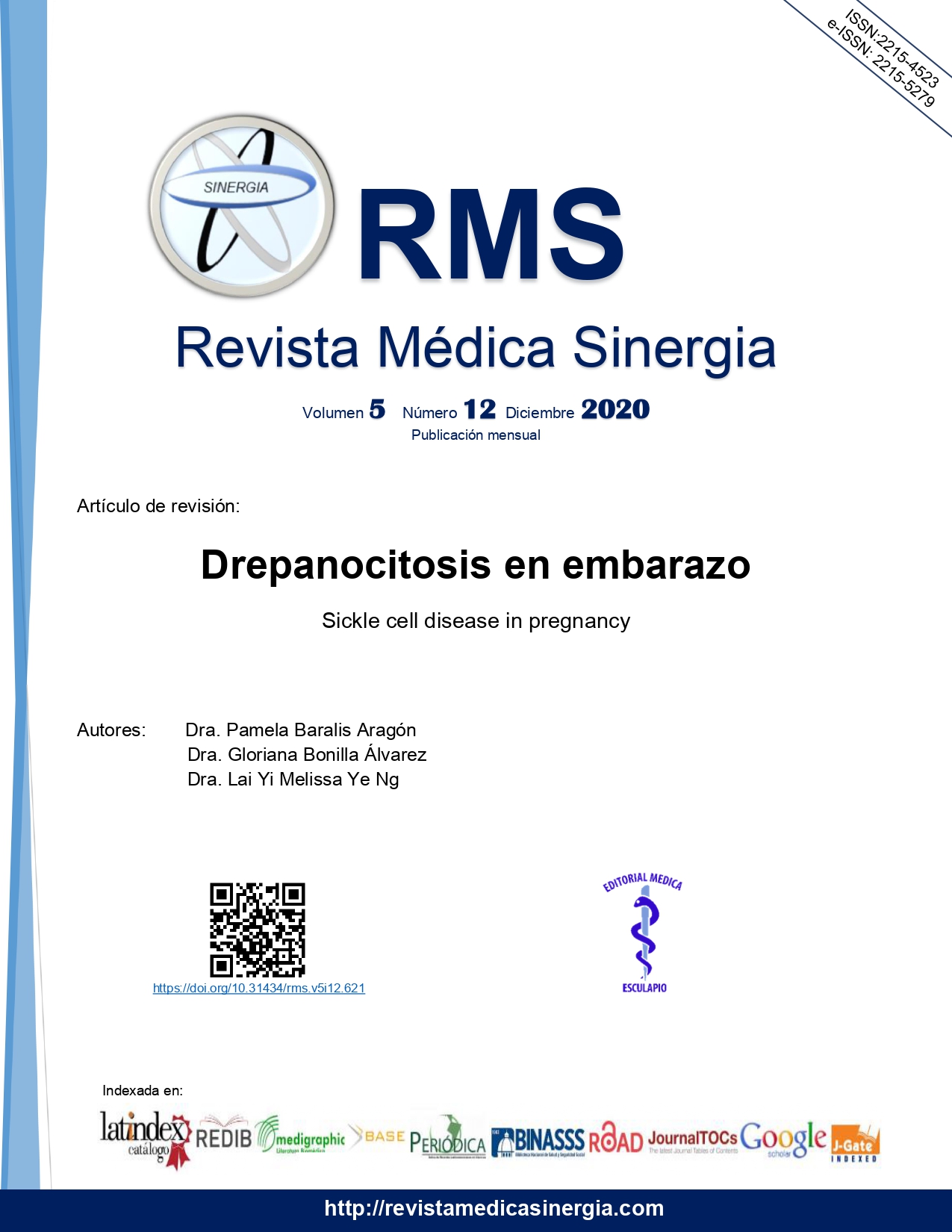Resumen
La drepanocitosis o anemia de células falciformes, corresponde a una hemoglobinopatía estructural común en el mundo. La clínica se resume en una serie de eventos desencadenados en primera instancia por oclusión vascular e isquemia tisular. Hoy en día, con instalaciones de atención médica mejoradas, acceso a transfusiones sanguíneas, profilaxis antibiótica, vacunación y disponibilidad de medicamentos como la hidroxiurea, es que la esperanza de vida de los pacientes con drepanocitosis ha mejorado. Cada vez son más las mujeres con drepanocitosis que alcanzan la edad reproductiva y externa el deseo de concebir. La drepanocitosis afecta negativamente el embarazo, lo que lleva a una mayor incidencia de complicaciones maternas y perinatales como preeclampsia, parto prematuro, restricción de crecimiento intrauterino y abortos. La atención adecuada durante el embarazo garantiza un mejor resultado. Además, los avances recientes en los campos del diagnóstico prenatal y el diagnóstico genético previo a la implantación ayudan a las parejas que padecen de drepanocitosis a tener un bebé sano en un contexto de seguridad para el binomio madre e hijo.
Palabras clave
Citas
Okusanya B.O, Oladapo O.T. Prophylactic versus selective blood transfusion for sickle cell disease in pregnancy. Cochrane Database of Systematic Reviews 2016 Issue 12. Art. No.: CD010378.: 1-23. https://doi.org/10.1002/14651858.CD010378.pub3
Pujadas X, Viñals L. Enfermedad de células falciformes en el embarazo. Revista Cubana de Obstetricia y Ginecología. 2016; 42 (2): 239-253. https://www.medigraphic.com/pdfs/revcubobsgin/cog-2016/cog162j.pdf
Ware R, Montalembert M, Tshilolo L, Abboud M. Sickle cell disease. The Lancet Published Online. 2017; 390(10091): 311-323. https://doi.org/10.1016/S0140-6736(17)30193-9
Jain D., Atmapoojya P., Colah R., Lodha P. Sickle cell disease and pregnancy. Mediterr J Hematol Infect Dis 2019; 11(1): e2019040, http://dx.doi.org/10.4084/MJHID.2019.040
Rogers K, Balachandrens N, Awogbade M, Jhons J. Sickle cell disease in pregnancy. Obstetrics, Gynaecology & Reproductive Medicine. 2019; 29: 61-69. https://doi.org/10.1016/j.ogrm.2019.01.006.
Piel F, Steinberg M, Rees D. Sickle Cell Disease. N Engl J Med. 2017; (376):1561-73. https://dx.doi.org/10.1056/NEJMra1510865
Sosa I. R, Udden M. M. Sickle Cell Disease and Pregnancy. En: Jeffrey P. Phelan, Luis D. Pacheco, Michael R. Foley, George R. Saade, Gary A. Dildy, and Michael A. Belfort editors. Critical Care Obstetrics, Sixth Edition. USA: John Wiley & Sons Ltd; 2019. P. 791–801. https://doi.org/10.1002/9781119129400.ch47
Hernández F, Segura K, Hernández E, Soto L, Luis C. Drepanocitosis: Evolución tecnológica y nuevos retos. Rev. Colegio de Microb. Quim. Clin. de Costa Rica. 2019; 25 (2): 101-107. Disponible en: http://revista.microbiologos.cr/wp-content/uploads/2019/09/Articulo-7.pdf
Boga C, Ozdogu H. Pregnancy and Sickle cell disease: A review of the current literature. Crit Rev Oncol Hematol. 2016; 98: 364-374. https://doi.org/10.1016/j.critrevonc.2015.11.018
Sharma A, Gaur K, Tiwari VP, Shukla S. Sickle cell disease presenting in the third trimester of pregnancy: Delayed detection heralding a public health problem? Indian J Public Health 2020;64:93-5.https://doi.org/10.4103/ijph.IJPH_223_19
Oteng-Ntim E, Meeks D, Seed P. T, Webster L, Howard J, Doyle P, & Chappell L. C. Adverse maternal and perinatal outcomes in pregnant women with sickle cell disease: systematic review and meta-analysis. Blood. 2015; 125(21), 3316–3325. https://doi.org/10.1182/blood-2014-11-607317
Boafor TK, Olayemi E, Galadanci N, Hayfron-Benjamin C, Dei-Adomakoh Y, Segbefia C, Kassim AA, Aliyu MH, Galadanci H, Tuuli MG, Rodeghier M, DeBaun M, Oppong SA. Pregnancy outcomes in women with sickle-cell disease in low and high income countries: a systematic review and meta-analysis. BJOG 2015; 123:691–698. https://doi.org/10.1111/1471-0528.13786
Patil V, Ratnayake G, Fastovets G. Clinical “pearls” of maternal critical care Part 2. Current Opinion in Anaesthesiology. 2017; 30(3), 326–334. DOI: 10.1097/aco.0000000000000464
Howard J. Sickle cell disease: when and how to transfuse. Hematology Am Soc Hematol Educ Program. 2016; (1): 625–631. https://doi.org/10.1182/asheducation-2016.1.625
Malinowski A. K, Shehata N, D’Souza R, Kuo K. H. M, Ward R, Shah P. S, & Murphy, K. Prophylactic transfusion for pregnant women with sickle cell disease: a systematic review and meta-analysis. Blood. 2015; 126(21), 2424–2435. https://doi.org/10.1182/blood-2015-06-649319
Chou S, Alsawas M, Fasano R, Field J, Hendrickson J, Howard J, Kameka M, Kwiatkowski J, Pirenne F, Shi P, Stowell S, Thein S, Westhoff C, Wong T, Akl, E. ASH 2020 guidelines for sickle cell disease: transfusion support. Blood advances. 2020; 4 (2): 327-355. https://doi.org/10.1182/bloodadvances.2019001143
Dolatkhah, R., Dastgiri, S. Blood transfusions for treating acute chest syndrome in people with sickle cell disease. Cochrane Database of Systematic Reviews. 2020; Issue 1. Art. No.: CD007843.https://doi.org/10.1002/14651858.CD007843.pub4
Hussein N, Weng S. F, Kai J, Kleijnen J, & Qureshi N. Preconception risk assessment for thalassaemia, sickle cell disease, cystic fibrosis and Tay-Sachs disease. Cochrane Database of Systematic Reviews.2018; Issue 3. Art. No.: CD010849. https://doi.org/10.1002/14651858.CD010849.pub3
Vichinsky, E. Pregnancy in women with sickle cell disease. UpToDate. (2018).https://www.uptodate.com/contents/pregnancy-in-women-with-sickle-cell-disease
Rizk S, Pulte E, Axelrod D, Ballas S. Perinatal Maternal Mortality in Sickle Cell Anemia: Two Case Reports and Review of Literature. Hemoglobin. 2017; 41(4-6): 225-229.https://doi.org/10.1080/03630269.2017.1397017

Esta obra está bajo una licencia internacional Creative Commons Atribución-NoComercial 4.0.
Derechos de autor 2020 Array


